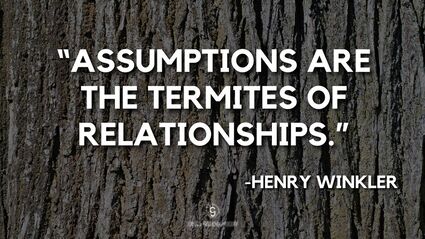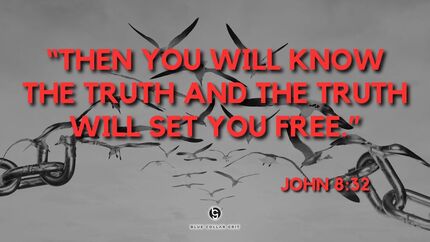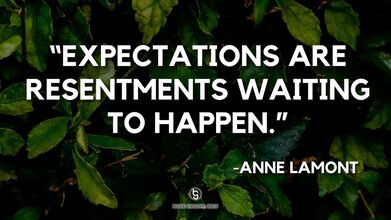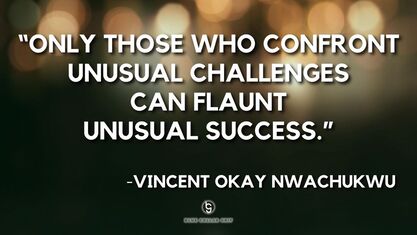Actions & IntentionsWe judge ourselves by our intent.
When we make a decision our intent is always factored in. What we plan to happen and what ultimately takes place may not align exactly, but that outcome is virtually irrelevant as it pertains to our judgment of ourselves. We are quick to dismiss an unfavorable result, or even questionable action, if our intent was pure to begin with. We judge others by their actions. When others make a decision we rarely consider their intent. Our judgment of others is based almost solely on the results of their actions. For others, it’s the intent that is irrelevant. Whether the intent was pure or questionable means nothing as long as the desired result was achieved. If the double standard seems troubling to you, it should be - especially as a leader. Why Should We Care? In leadership, our purpose should be grounded in servanthood. We should be attempting to move our team, and the individuals on it, forward. Of course, we will be judged by society based on the external scoreboard of results, but that doesn’t mean this form of assessment must be accepted by those actually doing the leading. Actually, it’s counterproductive to do so. Ultimately our intent drives our actions and our actions drive our results. To achieve success, jumping directly to an obsession with the result will produce fruit. The problem, or course, is that it won’t last. In order to sustain success, we must address intent. The grace we give ourselves needs to be afforded to those we lead. That grace is rooted in the consideration of our own intent. We know what we meant to say and to do, but we don’t have that same insight for others. It’s our job as a leader to know and understand the intent of those we lead. Without an understanding of intent, we create it for ourselves. And, it’s hardly ever accurate. REAL TALK - Action Steps Intent in others isn’t something that’s easy to assess, but necessary nonetheless. We must make it a priority if we are serious about leading and impacting to the best of our ability. Here are a few ideas to get you started.
Considering intent leads to understanding and acceptance. Focusing solely on actions places the responsibility for that narrative of intent in our hands. That’s a story we are very poor at telling accurately. Checkout Surrender the Outcome on Amazon and order The Score That Matters with Ryan Hawk & Brook Cupps before its release in March 2024. The latest blog from Blue Collar Grit can be found here!
1 Comment
Your Truth or Mine?The truth is …
You proclamations regarding truth all the time. Someone, out of the kindness of their heart, setting you straight on all the things you’ve got wrong - the lies that you believe. As if, by some miraculous gift, they have a truth that no one else is privy to. I know I’m guilty of it. Heck, I even write blogs about things that I believe to be the truth. In all honesty, I don’t know. I share as a means to clarify my thoughts and to help anyone that might have similar experiences and view life through a similar lens as me, but to say it’s the truth isn’t accurate. It would be more accurate to say it’s “my truth”. Why Should We Care? It seems we each have our own form of the truth. Looking around and observing the behaviors of other people, we begin to see this discrepancy more clearly. Decisions others make and actions they take oftentimes make little sense with respect to our values, beliefs, and focus in life. Yet, to them, it appears perfectly clear. A large part of our draw to certain people and groups is because they share a similar truth as we do. Clearly, we prefer to gather with people in line with our version of the truth rather than with people who oppose our truth. The importance of the safety and security a common truth offers is difficult to overstate. We are more likely to change our truth than we are to accept being ostracized and eliminated from the group. A common truth is central to the fabric of every team. In teams we ask each individual to prioritize the team over themselves. A truth such as the team being more important than the individual must be shared or the potential of the team is compromised. The humility to embrace this truth could determine our role, impact, or even place on the team. If our truth is not in line with that of the team we could be joining, we should opt for another team or the team should opt for a different team member. Too often salary, title, or benefits cloud our ability to choose teams that match our truths. Nothing is more important than the alignment of our truths. Before we can choose our team however, we need to know our truth. And, that’s not quite as easy as we think it is. REAL TALK - Action Steps Authentic means genuine or real; of undisputed origin. A search for authenticity is at the heart of every personal leadership journey, as it should be. However, this is not a journey for the weak. We will need to answer some tough questions on our way to the enlightenment that authenticity, and our personal truth, provides. Here are a few probing questions to get you started:
We don’t know but we would be wise to find the truth. More often than not, our truths are nothing more than strongly held opinions. The truth is the guiding light in our journey through life. If you haven’t found it, now is time to start looking for it. Checkout Surrender the Outcome on Amazon and order The Score That Matters with Ryan Hawk & Brook Cupps before its release in March 2024. The latest blog from Blue Collar Grit can be found here! For more information on building excellence in your teams, visit us at www.bluecollargrit.com. We would love to know how we could help! Releasing ExpectationsHave you ever taken a drink of a clear liquid, expecting it to taste like water, but instead it was something? If so, it likely caused you to immediately spit out whatever it was that you chose to drink. I was the victim of a cruel joke my mom played on me as a ten year old that still has me asking the ever-important question whenever I’m taking a drink of a clear liquid: “Is that water?” Some of you may remember Invisible Kool-Aid. Heck, it may still be a thing, unfortunately, I’ve been out of the Kool-Aid market for awhile now. But, back in the day, that was my go to beverage. Nothing beats playing outside for hours, working up an intense sweat, then coming in the house to an ice cold pitcher of Kool-Aid. Ah, those were the days. Anyway, one of those summer days, my mom decided to try out the new, groundbreaking Invisible Kool-Aid. The only problem was her not sharing this experiment with anyone. As my friends and I filtered into the house during one of our breaks, mom already had glasses poured and sitting on the table for us. A quick glance at the clear liquid in the glasses indicated water was the beverage of choice for the day. The sweetness of the surprisingly sugar rich Kool-Aid was met with spats and moans it had never heard. Of course, after the initial shock, we recovered to drink the entire pitcher after cleaning up the mess we had made. We expected water. And, even though we loved Kool-Aid, it wasn’t what we expected. Why Should We Care? So, what is it that you expect? The verb ‘expect’ is defined by Mirriam-Webster as “to anticipate or look forward to the coming or occurrence of.” The simplicity of the definition seems harmless enough, but if we’re not careful the expectations we set can erase the appreciation, enjoyment, and fulfillment we experience from many of the events in our lives. One of the primary issues with expectations is that they are concerns or anticipations of the future, not the present. When our focus is on the future we lose control of the present. Our intention within each moment is compromised for indifference or instant gratification. The only way to be our best in the future is to be our best now. The other issue with expectations that hold us back is that we typically externalize them rather than internalize them. We have expectations for others and for results that we hope to have, but often fail to have true expectations for ourselves in our daily behaviors and actions - the behaviors and actions that have the most significant impact on our lives. Both of these issues with expectations have the same thing in common: They are beyond our control. REAL TALK - Action Steps Expectations are present in all aspects of our life and they are generally viewed as a positive, driving force in our lives. This can certainly be true, however we need to be clear on what we are expecting of ourselves and others in many areas of our lives. Here are three aspects of life to be very deliberate with your expectations.
Releasing ourselves from expectations sounds like a recipe for mediocrity on the surface. In reality, it’s the only way to free ourselves to a life worthy of the only one we’ve been given. The shackles of expectations limit our courage and our courage is the paint brush that colors our lives. For more information on building excellence in your teams, visit us at www.bluecollargrit.com. We would love to know how we could help To Confront or Not ConfrontI think there are two ways to approach leading or coaching a team:
Neither approach is perfect. By minimizing disruption and challenge we are inherently ignoring issues that also limit the level of performance the team is capable of. By bringing these disruptions to the surface, we also increase the risk of not being able to move past them. Here’s a simple example from our current team: watching film to prepare for our next opponent. The program we use for film tracks the number of minutes each player watches. Early in our season we had a couple of big wins but our players were not preparing through film study to the level that is expected in our program. Thus, the question of whether or not to address the lack of film study became a topic of conversation among our coaches. The results were clearly “good” in terms of our team’s play to that point, why rock the boat? Minimizing disruption would mean ignoring the issue since it wasn’t having a negative impact on the result right now and may never have. Afterall, everyone is different and each person’s need for preparation varies. I mean, if it ain’t broke, don’t fix it, right? The argument for surfacing the issue was simply based on the standard of preparation established in our program. Not watching film in our program was not acceptable because it had the potential to compromise your performance. Compromising your individual performance threatens to compromise our collective performance. It points to a selfishness that has the potential to hurt the team and arrogance that ultimately hurts the individual. This decision is one of the major cruxes of leadership:
My only advice: confront more. Why Should We Care? Considering the example above regarding our players' preparation through film study, the decision of whether or not to confront the behavior becomes simple as soon as we clarify what we are trying to achieve. We prefer the term excellence rather than success, but defining success is critical to making this decision. If winning, for example, is success then not watching film is perfectly acceptable as long as the results are not compromised. If losing ever comes to the table, then we can revisit the behaviors that could be contributing to the loss. On the other hand, if creating excellence in our habits is success then not watching film to prepare to the best of your ability is absolutely a behavior that must be addressed regardless of the outcome of the game. Ignoring the responsibility to prepare shines a light on a lack of humility that makes excellence impossible. Without humility we don’t see the need to work. And, without work excellence is not an option. By creating clarity around success, we simplify decisions and create a filter of authenticity. Without a clear understanding of what success looks like to us, we become victims of our emotions and slaves to our circumstances. REAL TALK - Action Steps Since the answer to confront or not confront is contingent on our definition of success, here are a few ideas on defining success on your terms rather than simply accepting the societal definition of fame, fortune, and status.
Confrontation is never easy. Leadership isn’t supposed to be. Opportunities to confront behaviors within our teams are numerous daily. The sooner we stop ignoring and start confronting, the sooner we realize the potential of our teams, and ourselves. For more information on building excellence in your teams, visit us at www.bluecollargrit.com. We would love to know how we could help! |
About bcI'm a teacher, coach, and parent seeking excellence while defining success on my own terms. Archives
July 2024
Categories |





 RSS Feed
RSS Feed